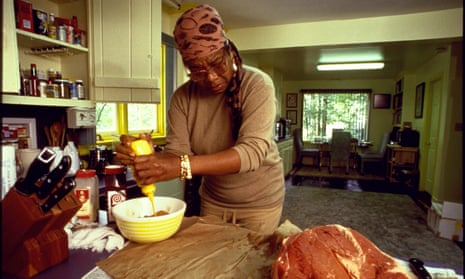Maya Angelou stands in the kitchen of her birdcage-lined home in Winston-Salem, North Carolina, preparing a feast for a crowd of 150. It is September 1994. She is 66. She stews crowder peas and okra, and grills a sturdy mass of baron of beef to honour two guests: Toni Morrison, who was awarded the Nobel prize for literature the year before, and who died a fortnight ago, and US poet laureate Rita Dove.
The house on Bartram Road would be cleared of its birdcages after Angelou’s death in 2014. After she died, the world honoured her work as a poet, a playwright and a memoirist, paying scant attention to her formidable skills as a cook.
Angelou published two cookbooks, Hallelujah! The Welcome Table in 2004 and Great Food, All Day Long in 2010. Somewhat unfairly, these books have been buried in her oeuvre. Her food writing hums with the same vibrancy that marks her more prominent work.
Cooking, Angelou wrote in her first cookbook, did not always come naturally to her. Her journey into the kitchen began uneasily in 1946, when she was a 17-year-old single mother looking for a job in San Francisco. The prospect of cooking anything but rice gave her the jitters, but she begged her way into a job in a Creole restaurant to provide for her infant son. Desperation and determination were her teachers in the kitchen.
Angelou’s recipes, and the essays bracketing them, are emotional. Some are strewn with trauma, like the caramel cake her grandmother baked as a gesture of love when Angelou, rendered mute at the age of seven after being raped, faced taunts at school. Other recipes sing with unmitigated joy, like the cassoulet she made for food writer MFK Fisher in the 1970s while living in Sonoma, California.
Angelou foresaw the struggle to gain respect from the literary establishment for her food writing. “I know some people might think it odd – unworthy even – for me to have written a cookbook,” she told the Guardian a year after her second one was published. Cooking was an extension of autobiography, she said, just another way to remind the world of the woman she was.

Comments (…)
Sign in or create your Guardian account to join the discussion